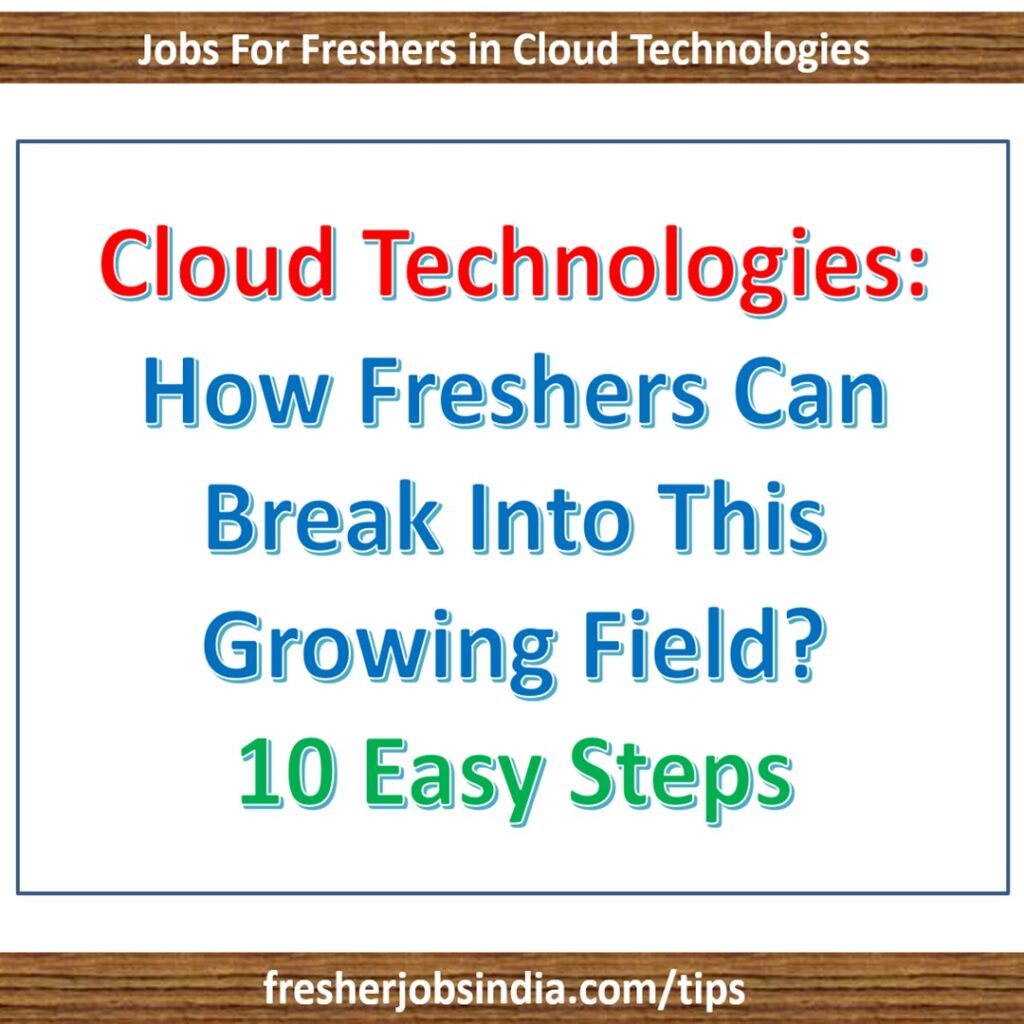Cloud Technologies: How Freshers Can Break Into This Growing Field?
Introduction
Cloud computing has revolutionized the IT landscape, offering scalable, cost-effective solutions for businesses worldwide. As organizations increasingly migrate to the cloud, the demand for skilled professionals in cloud technologies is soaring. For freshers looking to break into this rapidly growing field, the opportunities are immense, but so are the challenges.
Without prior experience, entering the cloud domain may seem daunting. However, with the right knowledge, hands-on practice, and a clear roadmap, freshers can successfully navigate their way to a thriving career in cloud computing. In this guide, we’ll explore the key steps to help you build essential cloud skills, earn certifications, and land your first job in this exciting and dynamic field. Whether you’re a recent graduate or transitioning into tech, this post will provide actionable insights to launch your cloud career with confidence.

Getting a job in the cloud technologies domain as a fresher can be an exciting challenge. Here’s a structured approach to help you break into this field:
1. Learn the Basics of Cloud Computing
- Start by understanding the fundamentals of cloud computing, which includes:
- Infrastructure as a Service (IaaS), Platform as a Service (PaaS), and Software as a Service (SaaS).
- Key concepts such as virtualization, networking, storage, and computing.
- Common cloud models: Public, Private, and Hybrid clouds.
- Free online resources, tutorials, and videos on platforms like YouTube, Coursera, and Udemy can be valuable.
2. Gain Hands-On Experience
- Create an account on major cloud platforms (many offer free-tier accounts):
- Amazon Web Services (AWS): Explore EC2, S3, Lambda, RDS.
- Microsoft Azure: Try out virtual machines, storage accounts, and Azure functions.
- Google Cloud Platform (GCP): Experiment with Compute Engine, Cloud Storage, and Kubernetes Engine.
- Build simple projects to get familiar with deploying applications, managing cloud services, and monitoring.
3. Earn Cloud Certifications
- Certifications are a great way to validate your knowledge and get noticed by employers. Entry-level certifications to consider:
- AWS Certified Cloud Practitioner
- Microsoft Azure Fundamentals (AZ-900)
- Google Cloud Associate Cloud Engineer
- These certifications demonstrate foundational cloud skills and knowledge of specific platforms.
4. Learn Relevant Programming and Scripting
- Cloud jobs often require programming and automation skills:
- Python and JavaScript are widely used in cloud environments.
- Bash or PowerShell for scripting and automating tasks.
- Learn about Infrastructure as Code (IaC) tools like Terraform, AWS CloudFormation, or Azure Resource Manager (ARM) templates.
5. Focus on Key Cloud Services
- Learn about essential cloud services such as:
- Compute: EC2 (AWS), Virtual Machines (Azure), Compute Engine (GCP).
- Storage: S3 (AWS), Blob Storage (Azure), Cloud Storage (GCP).
- Networking: VPCs, Load Balancers, VPNs, DNS services.
- Security: Identity and Access Management (IAM), encryption, security groups, firewalls.
- Explore DevOps tools (CI/CD, Jenkins, Docker, Kubernetes) since cloud is tightly integrated with DevOps.
6. Work on Cloud Projects
- Build and deploy small projects on cloud platforms:
- Create a static website hosted on AWS S3 or GCP Cloud Storage.
- Deploy a simple web application using EC2 or Azure App Services.
- Set up a small CI/CD pipeline using AWS CodePipeline or Jenkins.
- Share your projects on GitHub to showcase your cloud skills to potential employers.
7. Network with Cloud Professionals
- Join online cloud communities:
- Participate in forums like Stack Overflow, Reddit (r/cloud), or Cloud Developer subgroups.
- Attend meetups, webinars, and conferences (AWS re, Azure Cloud Summit).
- Follow cloud professionals on LinkedIn and engage with their posts or articles.
- Networking can help you discover job openings, referrals, and insights from experienced professionals.
8. Apply for Entry-Level Jobs or Internships
- Start with entry-level cloud roles such as:
- Cloud Support Associate
- Junior Cloud Engineer
- Cloud Operations Specialist
- Explore job boards and company websites for openings:
- LinkedIn Jobs, Indeed, Glassdoor, and specific company portals.
- Focus on companies hiring freshers and interns.
- Prepare your resume to highlight any relevant certifications, projects, and skills.
9. Develop Soft Skills
- Along with technical skills, employers value:
- Problem-solving skills: Key for troubleshooting cloud infrastructure issues.
- Communication: Being able to explain technical issues to non-technical stakeholders.
- Collaboration: Cloud jobs often require working closely with teams like DevOps, developers, and IT.
10. Prepare for Interviews
- Be ready to discuss cloud concepts, platforms, and hands-on projects.
- Common topics include:
- Virtualization and containerization (Docker, Kubernetes).
- Basic networking concepts (VPCs, subnets, firewalls).
- Cloud security practices.
- Troubleshooting cloud services.
By following this roadmap, you’ll build a solid foundation in cloud technologies and be better positioned to land a job in the domain. Consistency, hands-on practice, and networking are key.
Join our Whatsapp Channel: Click Here
Join our Telegram Channel: Click Here
Join us on Instagram: Click Here
How to Get Your First IT Job as a Fresher: A Complete Guide
Step-by-Step Guide: How to Become a Data Scientist?
Beginner’s Blueprint: Getting Your First Cyber Security Job as a Fresher
A Beginner’s Path to Becoming a Java Full Stack Developer
Cognizant Fresher Recruitment 2025 | Developer | Chennai
Yash Technologies Hiring Freshers 2025 | Trainee – SAP MM
Accenture Hiring Freshers 2025 | Graduates / Post-Graduates
Accenture Hiring Freshers 2025 | Graduates / Post-Graduates
TCS MBA HR Off Campus Hiring | 2023 and 2024 Batch Freshers
TCS MBA HR Off Campus Hiring | 2023 and 2024 Batch Freshers
Top Cloud Technology Certifications for Freshers
TCS MBA HR Off Campus Hiring | 2023 and 2024 Batch Freshers
Top Cloud Technology Certifications for Freshers
Accenture Hiring Freshers 2025 | Graduates / Post-Graduates
TCS MBA HR Off Campus Hiring | 2023 and 2024 Batch Freshers
Copyright 2024 © Fresher Jobs – India. All Rights Reserved.